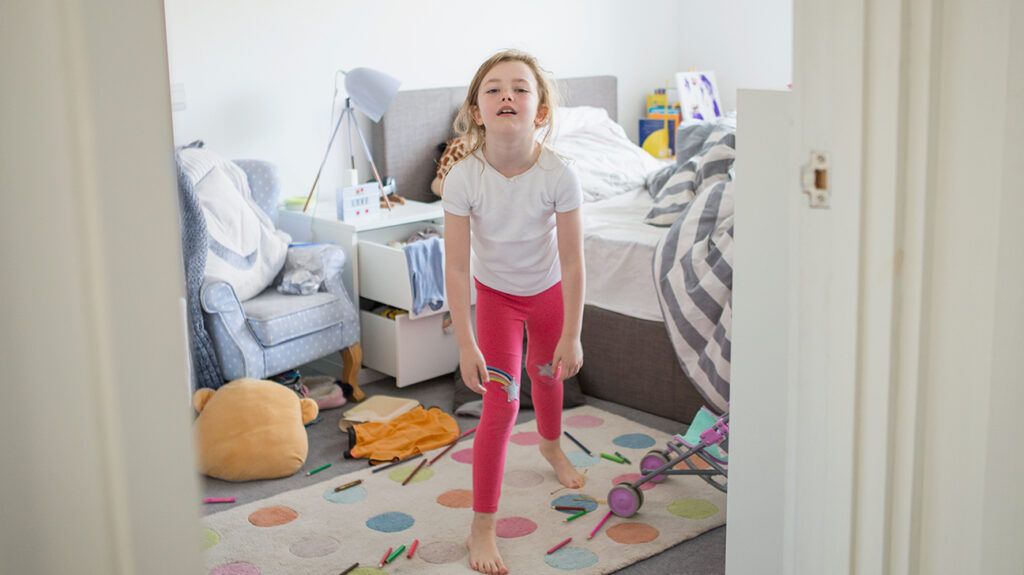If your child has more pee accidents than other kids the same age, you might wonder whether it’s connected to ADHD.

Attention deficit hyperactivity disorder (ADHD) is a neurodevelopmental condition that affects attention and behavior. Sometimes the unwanted behaviors that accompany ADHD can seem intentional.
A loss of control over urinating is called enuresis (eh-nyr-ee-suhs). When this happens at night, it’s called nocturnal enuresis. Daytime wetting is called diurnal enuresis.
Enuresis can result from a medical issue, like a structural or hormonal difference. A doctor can help diagnose or rule out this type of cause.
Sometimes wetting is connected to ADHD, and researchers are still trying to understand why.
If your child with ADHD experiences enuresis, they’re not alone. A 2020 study involving 100 children with diurnal enuresis found that 40% met the criteria for ADHD.
The same study also found that brain scans showing certain EEG waves might be able to identify ADHD in children experiencing enuresis.
“ADHD increases the likelihood of the presence of nocturnal enuresis, which is when kids involuntarily or voluntarily pee in bed,” explains Dr. Raffaello Antonino, the clinical director at Therapy Central and a counseling psychologist.
“Children with ADHD are also more likely to have diurnal enuresis, which relates to urinating in inappropriate places during daytime,” he adds.
In some cases, wetting might be purposeful behavior. Most voiding is involuntary, but occasionally it’s not.
Antonino, referring to information from the American Psychiatric Association (APA), says, “Incontinence among children with ADHD is potentially linked with oppositional defiant or conduct disorder.”
Oppositional defiant disorder (ODD) and conduct disorder feature behaviors meant to defy or annoy others. A child intentionally urinating on the floor is an example. Either of the two can commonly co-occur with ADHD.
But a child’s wetting can be accidental even if it seems otherwise. Considering other possibilities is essential because your child may feel embarrassed and regret when urination accidents happen.
“The link between ADHD and elimination disorders, including urinating, is highly complex, and there are many possible explanations,” Antonino says. Researchers do have some theories.
One possible cause is “urge incontinence, which involves a sudden onset of the urge to release urine,” he explains.
While there’s more information about the medical causes of urge incontinence, some research links ADHD to poor bladder control. For example, a 2019 study of 156 children found that ADHD was the most common psychiatric disorder in the study to be associated with lower urinary tract issues.
A
It’s easier to help your child reduce enuresis if you understand the cause.
Attention
Potty accidents can be purposeful, attention-seeking behaviors. Life is busy, and your child may feel like they’re competing for your attention.
Tip:
If you reward the behavior you want, you’ll likely get more of it. For example, giving your child attention when they’re behaving well but remaining calm and helping your child clean up after wetting.
Executive function issue
Executive function is thinking that allows you to make decisions and regulate your behavior. Both ADHD and autism spectrum disorder (ASD) feature reduced executive function.
Self-monitoring is an executive function skill. If your child has weak executive function, they might not pay attention to the signals indicating they need to use the bathroom.
Tip:
You can strengthen your child’s executive function by creating habits like using the bathroom before leaving the house or before bed to reduce accidents.
Hyperactivity or inattention
Some researchers think that sleep deprivation leading to hyperactivity and inattention might contribute to a child’s wetting.
Tip:
Sleep-promoting strategies that may help your child include reduced evening screen time and regular exercise. Relaxation exercises and avoiding caffeine can also help.
Overwhelm, overstimulation
Overstimulation can overwhelm many, but children with ADHD may be particularly affected. Too much sensory input can create overload, making it difficult to pay attention to bladder body signals.
Tip:
Even young children can learn mindfulness if you participate and create a peaceful environment. It’s easiest to start with short breathing exercises you can do together. Try finding time each day to practice, like before bed as a wind-down activity.
ADHD and hypersensitivity
Some people living with ADHD can experience hypersensitivity.
If you’ve ever seen your child cover their ears to shield themselves from sound or tug at a shirt they find itchy, you’ve witnessed hypersensitivity in action. Hypersensitivity makes a person more likely to experience overstimulation, making it difficult to recognize body signals.
Tip:
You can help your child manage ADHD hypersensitivity by teaching them boundaries and self-advocacy. Let them know it’s OK to ask for a different shirt or say that the TV is too loud for them.
Teaching them assertiveness can help them regulate their sensory input, which could reduce wetting.
Urinating in unusual places can be linked to ADHD. Not all children with ADHD have bladder control issues, but some do.
The wetting can be on purpose or accidental. When a child deliberately urinates where they shouldn’t, it might be attention-seeking behavior. It could also be defiance associated with ODD or conduct disorder, conditions that sometimes occur with ADHD.
Usually, peeing on themselves is not done on purpose. Children with ADHD have accidents for various reasons, like sensory overload or executive function issues.
It’s best to talk with a pediatrician if your child is having wetting accidents because it may be a condition of a serious underlying medical condition.
You can help your child with strategies like calming exercises and making a habit of using the restroom before the next activity.
